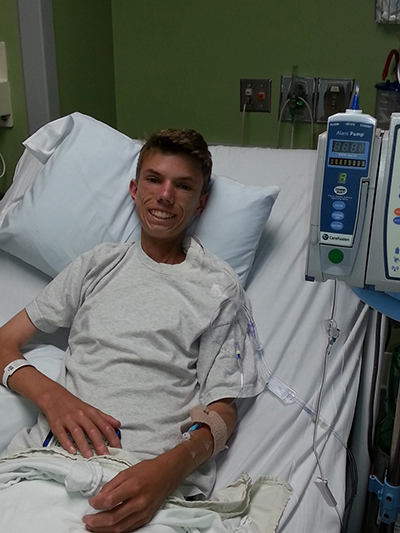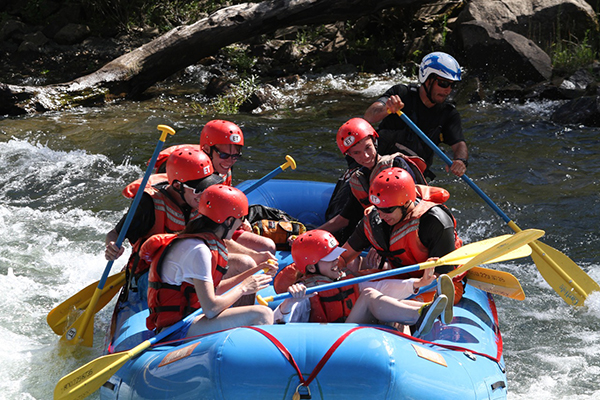|
Eric Priest: Evolving from High School to Dorm Room Living with Scleroderma and Being Away from Mom and Dad... When Eric Priest was 12 years old, he enjoyed playing soccer, baseball and going skiing with his family. Suddenly while on a family vacation, he started to experience a lot of pain in his hands. He also had difficulty putting on his socks and shoes as his joints became more stiff and sore.
Later that same year, Eric was pitching a lot for his baseball team. He started to form – what he and his family thought – was a callous on his hand. Turns out, a finger ulceration had developed. In June, he went to see his pediatrician for a routine exam before heading to Boy Scout camp. “Nobody really knew what it was at the time,” said his mom. “The doctors thought that it might be a MRSA infection so they referred him to a dermatologist.” At first, Eric was diagnosed with juvenile rheumatoid arthritis. Later, his diagnoses changed to diffuse systemic scleroderma.
Transitioning from living at home to a dorm room, certainly takes some time to adjust for any college freshmen. But, being a young adult living with a chronic illness, poses some additional challenges when you have to manage the disease on your own without mom or dad’s assistance. “I’m really not too worried,” said Eric. “I think I have it under control to live life with the disease. I have infusion therapy four times a year. I can arrange that around school vacations. It also helps that my brother and sister attend the same college.”
Mom and Dad, however, have some parental reservations about the transition. One factor is that now that he’s an adult, he needs to switch to an adult rheumatologist. “It definitely was a factor in deciding which schools he would go to,” said his dad David. “We wanted him to stay fairly close in case he needed to come home. He was accepted to eight schools in California and two in Arizona.” “In our family, we have had the philosophy to give our children as much responsibility as they can handle for their age,” said David. “All along, Eric has been expected to take care of himself, do his exercises, homework and take his medications. We monitor and remind him. But, ultimately, it’s his responsibility.”
For Eric’s high school graduation trip, he and his family, along with a foreign exchange student from Italy and some other friends, went on a whitewater rafting trip down the American River in California. Rafting is an activity that Eric loves as a Boy Scout. His parents say that he can paddle, but sometimes the positions in the raft stretch his joints out and make him tired. (Eric is on the upper right just in front of the guide.) Eric takes each day as it comes. One of the biggest lessons he’s learned from having the disease is, “I take things as they are given to me. You need to use the hand you’re dealt with to the best of your ability. You can’t let the disease get you down,” he said. Photos courtesy of the Priest family, Tim Haugh Photography and Whitewater Photos. |
|
Back
Understanding Scleroderma
Back
Treating Scleroderma
Back
Living Well with Scleroderma
Back
Advancing Research and Treatment
Back
Get Involved



 “He had such extreme pain in his hands while we were on a
ski vacation in early 2007, that he had to go inside,” said his mother Loral
Priest. “It turns out that it was the start of Raynaud Phenomenon, but we
didn’t know it at the time.”
“He had such extreme pain in his hands while we were on a
ski vacation in early 2007, that he had to go inside,” said his mother Loral
Priest. “It turns out that it was the start of Raynaud Phenomenon, but we
didn’t know it at the time.”
 Eric, who is now 17, and originally from San Diego, just
started college at the University of California at Berkeley. He plans to major
in economics. The college freshmen who once loved playing sports now has found
passions in other activities. “My whole childhood I played baseball, hockey, soccer
and other sports,” he said. “I was really disappointed when the doctors said
that I couldn’t play anymore. As a result, I became more involved in Boy
Scouts. I just earned my Eagle Scout. I also was the captain of my high
school’s robotics team. Our team has gone to the national championships for a
couple of years. That really helped feed my competitive side from when I played
sports.”
Eric, who is now 17, and originally from San Diego, just
started college at the University of California at Berkeley. He plans to major
in economics. The college freshmen who once loved playing sports now has found
passions in other activities. “My whole childhood I played baseball, hockey, soccer
and other sports,” he said. “I was really disappointed when the doctors said
that I couldn’t play anymore. As a result, I became more involved in Boy
Scouts. I just earned my Eagle Scout. I also was the captain of my high
school’s robotics team. Our team has gone to the national championships for a
couple of years. That really helped feed my competitive side from when I played
sports.”
